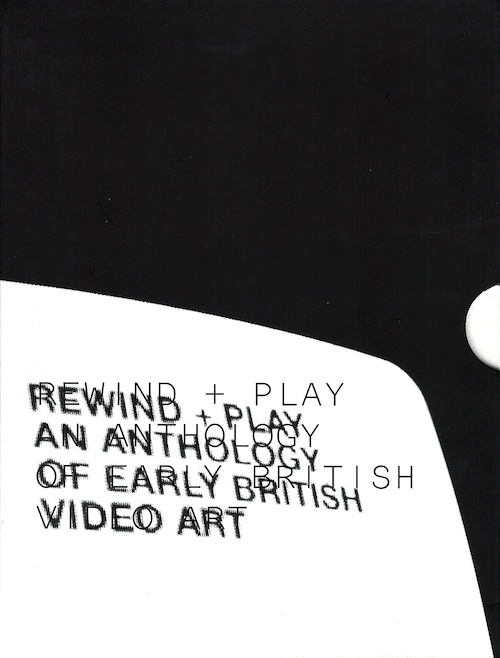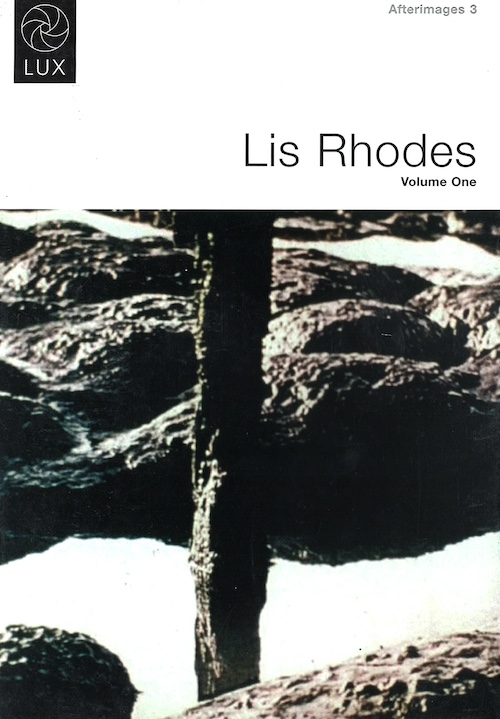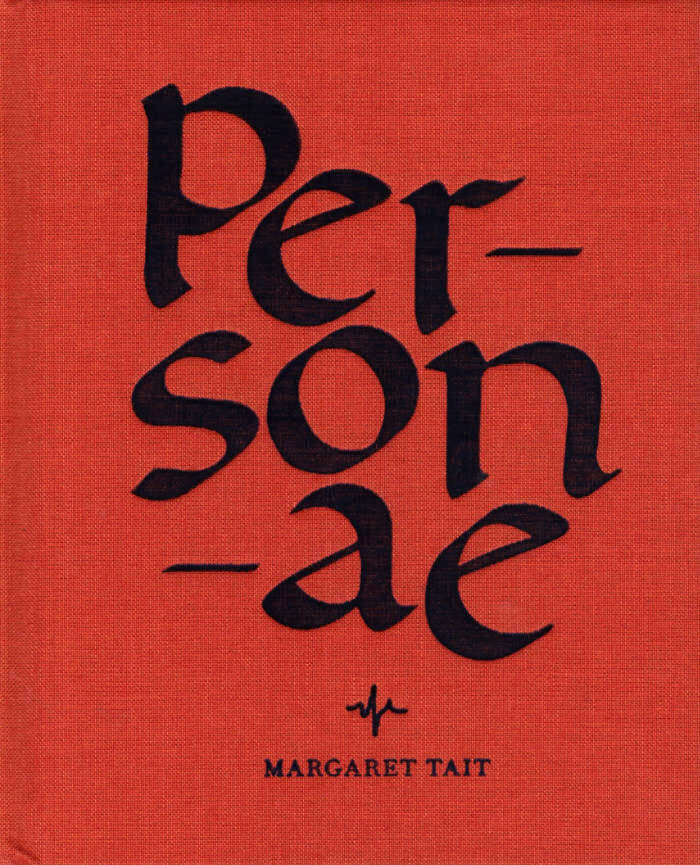LUX, London
LUX, London

Here is Information. Mobilise.
Here Is Information. Mobilise collects key critical writings by artist and curator Ian White (1971-2013), ranging from reviews and catalogue essays to entries from his blog Lives of Performers.
This volume brings together for the first time a selection of Ian White’s hugely influential writing on art and the moving image. It includes essays on animation and visual art, cinema’s relationship to conceptual art, and the idea of ‘liveness’ in performance and film, as well as texts on individual artists including Ruth Buchanan, Gabriel Byrne, Isa Genzken, Peter Gidal, Martin Gustavsson, Oliver Husain, Sharon Lockhart, Stuart Marshall, Yvonne Rainer, Jimmy Robert and David Wojnarowicz.

slow emergency siren, ongoing: Accessing Handsworth Songs
A unique limited edition accessible publication documenting a project to make Black Audio Film Collective’s seminal 1986 film Handsworth Songs more, and differently, accessible. Designed by Daly & Lyon it presents a new commissioned annotated audio description script from Elaine Lillian Joseph and new creative captions commissioned from the Care-fuffle Working Group alongside new essays by Clive Nwonka and Sarah Hayden.
The publication was produced in collaboration with Voices in the Gallery and with the support and advice of the UK Association for Accessible Formats and financial support from AHRC. The publication is also available in website form designed by An Endless Supply at slowemergencysiren.org.uk

REWIND PLAY: An Anthology of Early British Video Art
REWIND PLAY presents a selection of key works from the first decade of artist's video practice in the UK. From early conceptual experiments exploring the parameters of the medium to works dealing with media culture and television this collection explores the range and diversity of the first years of video as new media.
This three DVD box set including 24 videos by: John Adams, Peter Anderson, Kevin Atherton, Ian Bourn, Ian Breakwell, David Critchley, Peter Donebauer, Catherine Elwes, Judith Goddard, David Hall, Mick Hartney, Brian Hoey/Wendy Brown, Madelon Hooykaas/ Elsa Stansfield, Tina Keane, Tamara Krikorian, Mike Leggett, Stephen Littman, Stuart Marshall, Chris Meigh-Andrews/ Gabrielle Bown, Marcelline Mori, Stephen Partridge, Clive Richardson and Tony Sinden. Plus a new essay by Sean Cubitt, Professor of Media and Communications, University of Melbourne.
Total running time: 336 minutes. 3 x DVD 9, PAL, Region 0
Published in collaboration with REWIND| Artists' Video in the 70s and 80s.
Disc 1:
Stories, John Adams (1982, 13 min) Eyebath Peter Anderson (1977, 8 min) In Two Minds (2 screen version) Kevin Atherton (1978, 25 min) Lenny's Documentary Ian Bourn (1978, 45 min) In the Home Ian Breakwell (1980, 10 min)
Disc 2:
Pieces I Never Did (3 screen version), David Critchley (1979, 31 min) Circling, Peter Donebauer (1975, 12 min) Kensington Gore, Catherine Elwes (1981, 15 min) Time Spent, Judith Goddard (1981, 12 min) TV Interruptions (7 TV Pieces), David Hall (1971, 23 min) State of Division, Mick Hartney (1978, 5 min) The Extent of Three Bells, Steve Hawley (1981, 5 min) Flow, Brian Hoey/Wendy Brown (1977, 17 min)
Disc 3:
Split Seconds, Madelon Hooykaas/ Elsa Stansfield (1979, 11 min) Clapping Songs, Tina Keane (1979, 6 min) Vanitas, Tamara Krikorian (1977, 8 min) The Heart Cycle, Mike Leggett (1973, 9 min) Mirror, Stephen Littman (1979, 5 min) Go thru the Motions, Stuart Marshall (1975, 8 min) Continuum, Chris Meigh Andrews/Gabrielle Bown (1977 5 min) 2nd and 3rd Identity, Marcelline Mori (1978, 10 min) Monitor, Stephen Partridge (1975, 6 min) Video Sketches, Clive Richardson (1972, 22 min) Drift Guitars, Tony Sinden (1975 21 min)

Perestroika / Perestroika: Reconstructed
An autobiographical documentary, a fiction that's also an essay and an extended poetic meditation on the ability of the image to represent experience. Sarah Turner's film is a ghost story that explores what we forget and how we remember. The stunning imagery comes solely from the window of the Trans-Siberian train, shot first in 1987-8 and then again in 2007-8. The re-enactment of the journey is a memory work, a re-enactment of the past in the present through the process of filming. But the return journey is haunted by the voices of two dead friends that dominate the soundscape of the 'archive' footage. The film culminates at the haunting expanse of Lake Baikal, the deepest lake in the world.
Perestroika: Reconstructed re-mixes and extends Perestroika, into two sequences. Sequence one constitutes the 2009 version of the film, whilst the second sequence constructs a new framing narrative that reinterprets and reconfigures both the imagery and the experience of the first. Part psycho-geography, part dream and part environmental allegory, both sequences of Perestroika : Reconstructed conclude at Lake Baikal, contrasting experiences of terror and apocalypse with those of beauty and tranquility, the one contaminating the other. In this uncanny return, form stages thee through twinning the instability of memory and re-enacting that within the projective experience of cinema. This extended work delves further into ideas of momentary truth, identity, and how an uncontaminated experience of landscape is literally and metaphorically something that only exists in memory.
Publication contains DVD of Perestroika, which was released theatrically, blu-ray of Perestroika:Reconstructed, first exhibited as a gallery installation at London's Carroll/Fletcher Gallery April-May 2013, and a booklet of three essays by Elizabeth Cowie, Sophie Mayer, and Paul Newland.

Afterimages 2: Peter Gidal Volume 1
This DVD includes three seminal early films:
Key, 1968, 10 min.
Clouds, 1969, 10 min.
Room Film 1973, 1973, 55 min.
Peter Gidal's films have been an influence on several generations of artists. An important theorist and writer as well as a filmmaker since the late 1960s, Gidal was a pioneer of 'structural-materialist' film and his work has been shown around the world, including retrospectives at the ICA in London and the Centre Pompidou, Paris. You can read more about Peter Gidal on LUX Online.

Afterimages 3: Lis Rhodes Volume 1
This DVD contains:
Light Reading, 1978, 20 min.
Pictures on Pink Paper, 1982, 35 min.
Cold Draft, 1988, 28 min.
Lis Rhodes has been at the forefront of British experimental filmmaking since the early 1970s. She studied at the North East London Polytechnic and the Royal College of Art. A strong formal aesthetic has been developed in her films, reflecting her involvement with the debates and practice which emerged from the London Filmmakers' Co-operative, where she was Cinema Curator 1975-6. Early 'expanded' works such as Light Music (1975) fused performance and multi-screen projection with an exploration of the visual qualities of sound. Her analysis of broader political and social questions can be traced to her later films, which combine formal rigour with a passionate critique of issues from nuclear power to domestic violence. As an active campaigner for women's rights, Rhodes was a founder member of Circles, the first women's artist film and video (1979) and was an Arts Advisor to the Greater London Council between 1982 and 1985. She lives and works in London and teaches at Slade School of Fine Art, University College, London.

DWOSKINO. The Gaze of Stephen Dwoskin
Henry K Miller, Rachel Garfield
DWOSKINO. The Gaze of Stephen Dwoskin is the culmination of a three year research project, The Legacies of Stephen Dwoskin, at the University of Reading where his archive is housed. The book is a unique visual distillation of Dwoskin’s life and times, with hundreds of never-seen-before images taken from his archive, and texts by among others Laura Mulvey, Raymond Bellour, Raymond Durgnat, and Dwoskin himself.
Stephen Dwoskin (1939–2012) began his filmmaking career in the New York underground scene of the early 1960s, then moved to London in 1964, where he became a leading figure in avant-garde film, and was one of the founders of the London Filmmakers Co-operative (now LUX). His early works, such as Dyn Amo (1972), are synonymous with the male gaze. Laura Mulvey wrote that he ‘opened a completely new perspective for me on cinematic voyeurism’ and his work was a major influence on her influential work on the male gaze in cinema. From the mid-1970s, he focused his camera upon his own body, afflicted by polio during childhood, in such films as Behindert (1974) and Outside In (1981).

Personae
Personae is an unpublished book by Scottish filmmaker and poet Margaret Tait (1918-1999), edited by Sarah Neely with a foreword by Ali Smith
Margaret Tait (1918-1999), filmmaker and poet, is one of Scotland’s most extraordinary talents, and yet she was largely overlooked during her lifetime. Born in Orkney, she trained first as a medical doctor and served in the Royal Army Medical Corps during the Second World War, before studying film at Centro Sperimentale di Cinematographia in Rome in the early 1950s. After returning to Edinburgh, Tait established her film studio, Ancona Films, before eventually returning to Orkney in the 1960s, where she lived and continued to make films until her death in 1999.
While best known as a filmmaker, she was also a prolific writer and during her lifetime she self-published three books of poetry and two collections of short stories. Personae is her unpublished manuscript written over a number of years from 1945 onwards and painstakingly reconstructed by Sarah Neely from drafts found in the Tait archive. It is an undefinable work, part-memoir, part-experimental non-fiction; a meditation on the aftermath of war, the healing potential of the creative process, medicine, culture, relationships and an attempt to think towards a future born out of chaos. The book also offers a unique insight into the voice, mind and creative process of a singular Scottish artist whose work did not receive significant attention until after her death in 1999.

Shoot Shoot Shoot: The First Decade of the London Film-Makers' Co-operative 1966-76
The 1960s and 1970s were a defining period for artists’ film and video, and the London Film-Makers’ Co-operative (LFMC) was one of the major international centres. Shoot Shoot Shoot documents the first decade of an artist-led organisation that pioneered the moving image as an art form in the UK, tracing its development from within London’s counterculture towards establishing its own identity within premises that uniquely incorporated a distribution office, cinema space and film workshop.
Contributions from: Antony Balch, Ian Breakwell, Bob Cobbing, John Collins, David Crosswaite, David Curtis, Fred Drummond, John Du Cane, Mike Dunford, Ray Durgnat, Deke Dusinberre, Stephen Dwoskin, Gill Eatherley, Steve Farrer, Simon Field, Chris Garratt, Peter Gidal, Marilyn Halford, David Hall, Roger Hammond, Simon Hartog, Ron Haselden, Jim Haynes, Roger Hewins, Tony Hill, Jeff Keen, Ian Kerr, Jonathan Langran, David Larcher, John Latham, Malcolm Le Grice, Mike Leggett, Carla Liss, John Mathews, Harvey Matusow, Anthony McCall, Barry Miles, Jack Henry Moore, Annabel Nicolson, Jenny Okun, David Parsons, Sally Potter, Stuart Pound, William Raban, Anne Rees-Mogg, Lis Rhodes, Carolee Schneemann, Anthony Scott, Guy Sherwin, John Smith, Chris Welsby. Illustrated throughout in full colour, this book brings together a wide variety of texts, images and archival documents, and includes newly commissioned essays by Mark Webber, Kathryn Siegel and Federico Windhausen.
LUX, London / 2016
Paperback, 288 pages incl 193 full colour illustrations